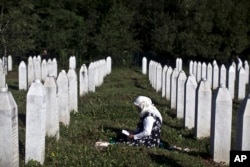U.S. Secretary of State John Kerry's designation Thursday that the Islamic State (IS) is responsible for genocide against some minorities in Iraq and Syria represents a highly symbolic and rare move.
"It is the first time this administration has declared a genocide," Cameron Hudson, director of the Simon-Skjodt Center for the Prevention of Genocide at the Holocaust Museum in Washington, told VOA.
"The Bush administration is the last time — in Darfur more than a decade ago — that we declared a genocide. And before that it was the Clinton administration in Rwanda," he said.
He said such declarations are "historic events" that become legacies of those presidencies.
Deterrent
While the designation does not legally require the U.S. to take any particular action, it carries a certain moral force, says Gregory Stanton, a Research Professor in Genocide Studies and Prevention at George Mason University.
He says that in past instances such as Rwanda, Bosnia, Kosovo and Darfur — where terms such as "crimes against humanity" or "ethnic cleansing" were used — no forceful action was taken to stop the crimes.
"In the case of Bosnia, it was quite dramatic," Stanton said. "As soon as we called it genocide after the Srebrenica massacre in July of 1995, we began bombing the Serb forces, the Bosnian Serb forces, and it brought the war to an end."
However, seven years after the International Criminal Court indicted the president of Sudan for war crimes, crimes against humanity and genocide in the Darfur region of that country, atrocities continue.
Accountability
Kerry said the U.S. and international community must recognize what IS is doing to its victims, and the perpetrators must be held accountable.
"Naming these crimes is important, but what is essential is to stop them," Kerry said.
"I think it is significant because, up until today, we have treated ISIS solely as a terrorist group and have been conducting a war against them with little regard to the crimes that were being committed on the ground," said Hudson of the Holocaust Museum, using an acronym for Islamic State.
"This opens up a new policy approach for the administration to really try to gather evidence and pursue a potential prosecution for the crimes committed," he added.














